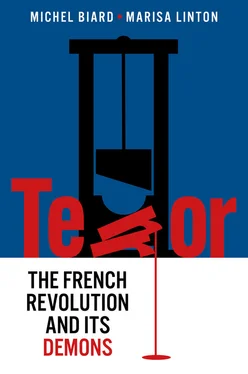We should also be aware that part of the reason why our minds picture the guillotine and the Revolutionary Tribunal as so powerful and so indelibly redolent of terror – literally terrifying – is that French revolutionaries made it that way. If we still, in the present day, think of the French Revolution as synonymous with the theatre of the guillotine, this is due in large part to the symbolism, rhetoric and imagery deployed by the revolutionaries as a deliberate strategy, presenting themselves as striking back hard at the Republic’s many enemies through this spectacular form of revolutionary justice. In this sense, the revolutionary terror was, as Carla Hesse concludes, ‘a weapon of the weak’. 10
Finally, there is the problem that to label what happened in France as the Terror , encourages the misleading supposition that somehow ‘terror’ was specifically and uniquely French, attributable to some endemic characteristic of the French situation or political theory. If we state that only France in the late eighteenth century had the Terror , how then do we designate the violence of the American Revolution, or the brutal repression by English forces of the revolt in Ireland in 1798? To quote Hesse again: ‘The French Revolution was, it is now clear, quantitatively , a no more – and probably a significantly less – violent affair than its sister revolution across the Atlantic’. 11The American and French Revolutions shared much common ancestry, though they developed in different ways. ‘Liberty or death’ was a rallying cry for both. It was a phrase that owed much to ideas about love of liberty and devotion to political virtue, drawn and adapted from the common culture of classical antiquity. Its literal meaning, in the words of the American revolutionary, Patrick Henry in 1775, was ‘give me liberty or give me death’. 12For many of the French revolutionaries this would be their fate. They sought liberty, but ultimately the demons of terror brought death. This book is an attempt to explain how that happened.
1 1. Jules Michelet, Histoire de la Révolution française, Paris, Chamerot, 1847, vol. I, p. XI. The definite article and the capital T then reappear many times in his writings, above all in volumes VI and VII, devoted to the years 1793 and 1794, even if there is nothing systematic about their employment. In 1841, a capital letter also features in the Souvenirs de la Terreur, but only in the title of the work, which is something else (Souvenirs de la Terreur de 1788 à 1793, par M. Georges Duval; précé-dés d’une introduction historique par M. Charles Nodier, Paris, Werdet, 1841). Moreover, the author himself distinguishes between the use or non-use of capital letters, especially since he systematically underlines the term in italics: ‘Now a word about the title of my book. I entitle it Souvenirs de la Terreur, although my account begins in the year 1788. It’s my opinion that the terror began at the same time as the revolution […] up until 9 thermidor of the year 2 of the republic, Paris and the whole of France were under the yoke of the terror’ (ibid., pp. ix–x). Precedents also exist for the use of capital letters in the title of a work but not in its text (thus Des Effets de la Terreur by Benjamin Constant in the Year V, and again the capitalization does not appear clearly until the ‘printer’s notice’ that opens the edition. The title itself is composed entirely in capital letters). On the other hand, in their original editions, the first histories of the French Revolution, by Thiers (1823–1827), Mignet (1824), Buchez and Roux (1834–1838), Blanc (1847–1862) and Lamartine (1847) do not use the word with a capital T. Lamartine sometimes emphasized the word using italics, but not in a systematic way, and without using capitalization. Cabet, for his part, sometimes used it in his own account of the Revolution, but this is hardly significant, because this author multiplies his use of capitals erroneously and indiscriminately, for example to write: ‘People’, ‘Virtue’, ‘Morality’, ‘Deputy’, etc. (Etienne Cabet, Histoire populaire de la Révolution française de 1789 à 1830, Paris, Pagnerre, 1839–1840).
2 2. Louis Blanc, Histoire de la Révolution française, Paris, Furnes, Pagnerre, second edition, 1869. Louis Blanc had previously critiqued Quinet’s use of the term: ‘I would not be one of those whom Edgar Quinet’s book has deeply grieved, if the author had not distorted […] the nature of what he condemns […] if, by making the Terror a system, he had not made the most intelligent and devoted revolutionaries responsible for the fatality they had to endure and the very excesses they fought against […] No, no, whatever Mr. Quinet says, the Terror was not a system; it was, quite otherwise, an immense misfortune, born of prodigious peril’ (ibid., vol. I, pp. xvii–xviii. The italicizations are those of Louis Blanc). The work of Edgar Quinet had appeared in 1865 under the title La Révolution, Paris, Lacroix, Verboeckhoven.
3 3. The politics behind this controversy featured in a polemical study by Steven Kaplan, Farewell Revolution: The Historians’ Feud, France, 1789–1989, Ithaca, NY, Cornell University Press, 1996 (French edition, 1993).
4 4. Simon Schama, Citizens: A Chronicle of the French Revolution, London, Penguin, 1989.
5 5. For recent approaches to these debates, see the contributions by Michel Biard, Mette Harder, Carla Hesse and Ronen Steinberg, edited and introduced by Marisa Linton, to ‘Rethinking the French Revolutionary Terror’, part of the H-France Salon, ‘230 Years After: What does the French Revolution Mean Today?’, H-France Salon, vol. 11, nos 16–21 (2019), at: https://h-france.net/h-france-salon-volume-11-2019/
6 6. Timothy Tackett, Anatomie de la Terreur. Le processus révolutionnaire 1787–1793, Paris, Le Seuil, 2018 (the English-language edition appeared under the title: The Coming of the Terror in the French Revolution, Cambridge, MA, Harvard University Press, 2015). As an indication of a shift in Tackett’s own thinking, this sentence does not appear in the original edition, but in a note in the foreword to the French edition (p. 379).
7 7. See Howard G. Brown, ‘The Thermidorians’ Terror: Atrocities, Tragedies, Trauma’, in David A. Bell and Yair Mintzker (eds), Rethinking the Age of Revolutions: France and the Birth of the Modern World, Oxford, Oxford University Press, 2018, pp. 193–235. Brown states that, ‘The “Terror” as a distinct period of the French Revolution was largely a construct of lawmakers who took the reins of government after the defeat of Robespierre and his closest allies’.
8 8. Haim Burstin, Révolutionnaires. Pour une anthropologie politique de la Révolution française, Paris, Vendémiaire, 2013. François Furet and Denis Richet, La Révolution, Paris, Hachette, 1965–1966.
9 9. It was Napoleon Bonaparte, some years after the time designated as the Terror, who forcibly reinstated slavery in those colonies that remained to France. Saint-Domingue remained at liberty, though at a terrible cost in lives. The complex issue of slavery in the colonies and within France has generated a formidable historiography, including Jeremy Popkin, You Are All Free: The Haitian Revolution and the Abolition of Slavery, Cambridge, Cambridge University Press, 2010; and Laurent Dubois, Avengers of the New World: The Story of the Haitian Revolution, Cambridge, MA, Harvard University Press, 2005. For recent thinking on the problematic nature of ‘rights’, see the contributions by Mita Choudhury, Pernille Røge and Pierre Serna, edited and introduced by Ian Coller to ‘Whose Revolution?’, part of the H-France Salon, ‘230 Years After’.
10 10. Carla Hesse, ‘Terror and the Revolutionary Tribunals’, in ‘Rethinking the French Revolutionary Terror’.
Читать дальше












